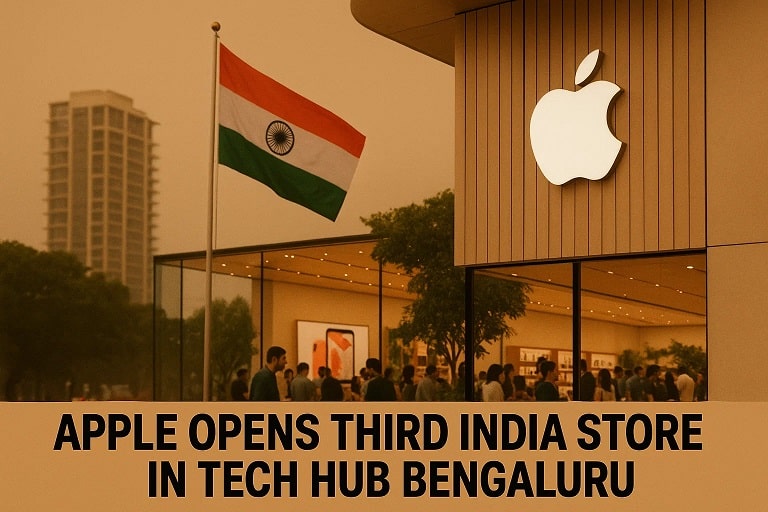Apple Opens Third India Store in Bengaluru: A Strategic Move in the Tech Hub
On September 2, 2025, Apple opened its third retail store in India, Apple Hebbal, located at the Phoenix Mall of Asia in Bengaluru, Karnataka, marking its first retail presence in South India. This follows the successful launches of Apple BKC in Mumbai and Apple Saket in Delhi in April 2023, alongside the Apple Store online. The 8,000-square-foot store, inaugurated at 1 PM IST, is designed as a community hub, offering the full range of Apple products, personalized support, and free Today at Apple sessions. Positioned in India’s technology capital, the launch aligns with Apple’s broader strategy to deepen its retail and manufacturing footprint in India, especially ahead of the iPhone 17 series debut on September 9, 2025. This article explores the drivers behind the store opening, historical context, future projections, and impacts, with a focus on Bengaluru’s role and Tamil Nadu’s indirect influence.
Why This Store Opening Matters
Bengaluru, home to global tech giants and a vibrant startup ecosystem, drives nearly 30% of India’s premium smartphone sales alongside Mumbai, Delhi-NCR, Pune, and Hyderabad. Apple’s entry into Bengaluru taps into India’s $12.1 billion smartphone market (2025 projection), where devices above ₹45,000 account for 25% of sales. The store strengthens Apple’s brand visibility and supports India’s growing role as a manufacturing hub, with most iPhones sold in the US expected to be “Made in India” by June 2025. For Tamil Nadu, a key manufacturing hub with Foxconn’s Sriperumbudur facility, the Bengaluru store enhances Apple’s regional ecosystem, indirectly boosting supply chain and retail opportunities.
Latest Developments Driving the Store Opening
The launch of Apple Hebbal reflects Apple’s strategic expansion in India amid global trade shifts and domestic market growth. Key developments include:
- Store Details: Apple Hebbal, located at Phoenix Mall of Asia (F-39-F-43, Bellary Road, Byatarayanapura), spans 8,000 sq ft under a 10-year lease signed in November 2024, with an annual rent of ₹2.09 crore and a 2-2.5% revenue-sharing model. The store features peacock-inspired artwork, a nod to India’s national bird, and operates on 100% renewable energy, maintaining carbon neutrality.
- Product and Services: Customers can explore the iPhone 16 lineup, MacBook Pro with M4 chips, iPad Air with Apple Pencil Pro, Apple Watch Series 10, AirPods 4, and AirTag. The store offers Genius Bar support, personalized setups, trade-in options, and financing. Free Today at Apple sessions cover photography, Apple Intelligence, and iPad sketching, with group bookings for families, students, and businesses.
- Team and Accessibility: The store employs 70 staff from 15 Indian states, communicating in 27 languages, including Kannada, Hindi, Tamil, Telugu, and Marathi, ensuring inclusivity.
- Strategic Timing: The opening, just before the iPhone 17 launch on September 9, 2025, capitalizes on festive season demand. Customers can pre-order online and pick up at the store.
- Global Trade Context: US tariffs (50% on Indian imports, August 2025) and tensions with China have pushed Apple to shift iPhone production to India, with Foxconn’s ₹25,000 crore Bengaluru facility starting iPhone 17 production.
Bengaluru and Tamil Nadu’s Role
Bengaluru’s tech ecosystem, hosting firms like Infosys and Wipro, makes it ideal for Apple’s retail expansion. The store supports local startups and SMEs through dedicated Business Pros, fostering innovation. Tamil Nadu, with Foxconn’s Chennai-area facility producing 70% of India’s iPhones, benefits indirectly as Apple’s supply chain strengthens, potentially increasing jobs and supplier contracts in Chennai and Coimbatore.
Historical Context of Apple’s India Journey
Apple’s expansion in India has accelerated since the 2010s, driven by market potential and manufacturing shifts:
- 2016-2020: Apple began manufacturing in India via Wistron and Foxconn in Tamil Nadu, starting with iPhone SE. Exports grew from $1 billion (2018) to $10.8 billion (2024).
- 2023: Apple opened Apple BKC (20,800 sq ft, Mumbai) and Apple Saket (Delhi), generating ₹800 crore in debut-year revenue, with Saket outperforming globally.
- 2024-2025: India became Apple’s fourth-largest iPhone market, shipping 12 million units in 2024. Apple leased 2.7 lakh sq ft of office space in Bengaluru (₹1,010 crore over 10 years) and 64,125 sq ft in Hyderabad, signaling long-term investment.
- 2025: Apple Hebbal’s launch and Foxconn’s Bengaluru unit mark India’s rise as a global iPhone manufacturing hub, with 70% of US-bound iPhones to be made in India by June 2025.
This timeline reflects Apple’s shift from a sales-focused to a manufacturing and retail-driven strategy in India, despite challenges like high tariffs and regulatory hurdles.
Future Scopes and Projections
Apple plans to open three more stores in Pune (Apple Koregaon Park, September 4, 2025), Mumbai (Oberoi Sky City Mall), and Delhi-NCR, bringing its India total to six by late 2025. iPhone sales are projected to hit $12.1 billion in 2025, up from $10.8 billion in 2024, with exports reaching $15 billion.
Long-Term Strategic Outlook
By 2030, Apple aims to:
- Expand Retail: Operate 10+ stores in India, targeting 20% of the premium smartphone market.
- Boost Manufacturing: Produce 50% of global iPhones in India, leveraging Tamil Nadu and Karnataka facilities.
- Enhance Services: Scale Apple Music, Apple Pay, and iCloud via stores, with Tamil Nadu’s urban centers driving adoption.
- Support Startups: Foster India’s startup ecosystem through Today at Apple and Business Pros, with Bengaluru and Chennai as hubs.
Potential Challenges
- US Tariffs: 50% tariffs on Indian exports could raise iPhone prices, impacting affordability.
- Competition: Samsung and Xiaomi dominate India’s mid-range market, challenging Apple’s premium segment.
- Digital Divide: Rural areas, even in Tamil Nadu, face connectivity issues, limiting online sales integration.
- Regulatory Risks: India’s import duties and data localization laws could complicate operations.
Impacts on the Indian Economy and Stakeholders
The Apple Hebbal store strengthens India’s tech ecosystem, with Bengaluru and Tamil Nadu as key beneficiaries.
Sector-Wise Impacts
Technology and Retail
- Impact: The store boosts premium smartphone sales (25% of India’s market) and supports Bengaluru’s tech ecosystem. Tamil Nadu’s retailers benefit from increased Apple brand visibility.
- Economic Contribution: The store could generate ₹400 crore annually, with Tamil Nadu gaining ₹50 crore via supply chain and retail spillovers.
- Business Opportunities: Chennai’s resellers and e-commerce platforms will see higher demand for Apple accessories.
Manufacturing
- Impact: Foxconn’s Bengaluru and Tamil Nadu facilities drive iPhone exports (₹1.5 lakh crore in FY25), creating 50,000 jobs, with 20,000 in Tamil Nadu.
- Economic Contribution: Manufacturing adds ₹10,000 crore to GDP, with Tamil Nadu contributing 40%.
- Business Opportunities: Component suppliers in Chennai will secure contracts with Foxconn.
Startups and SMEs
- Impact: Apple’s Business Pros support Bengaluru’s 10,000+ startups, with Tamil Nadu’s Coimbatore startups gaining from tech adoption.
- Economic Contribution: Startup growth could add ₹5,000 crore to GDP, with Tamil Nadu contributing 15%.
- Business Opportunities: App developers in Chennai and Bengaluru will leverage Apple’s ecosystem.
Employment
- Impact: The store’s 70 employees and Foxconn’s facilities create direct and indirect jobs, with Tamil Nadu’s manufacturing workforce expanding.
- Economic Contribution: Job creation adds ₹2,000 crore to regional economies, with Tamil Nadu gaining 30%.
- Business Opportunities: Training institutes in Chennai will support Apple’s skilling programs.
Apple India Store Snapshot
Store | Location | Size (sq ft) | Opening Date | Annual Rent (₹ crore) | Key Features |
|---|---|---|---|---|---|
Apple BKC | Mumbai, Jio World Drive | 20,800 | April 2023 | 4.2 | Flagship, timber ceiling |
Apple Saket | Delhi, Select Citywalk Mall | 8,000 | April 2023 | 2.0 | High revenue, urban hub |
Apple Hebbal | Bengaluru, Phoenix Mall | 8,000 | September 2, 2025 | 2.09 | Peacock design, carbon neutral |
Apple Koregaon | Pune, Koregaon Park (planned) | TBD | September 4, 2025 | TBD | Startup-focused, upcoming |
This table compares Apple’s India stores, highlighting Bengaluru’s role.
Frequently Asked Questions (FAQs)
Where is Apple Hebbal located?
Apple Hebbal is at Phoenix Mall of Asia, Bellary Road, Byatarayanapura, Bengaluru (F-39-F-43, 560092), opening on September 2, 2025, at 1 PM IST.
What services does Apple Hebbal offer?
It provides the full Apple product lineup, Genius Bar support, Today at Apple sessions, trade-in options, financing, and business consultations in 27 languages.
How does this impact Tamil Nadu?
Tamil Nadu benefits indirectly through Apple’s manufacturing in Sriperumbudur, boosting jobs and supplier contracts, with Chennai retailers gaining from brand visibility.
Why is Bengaluru significant for Apple?
As India’s tech hub, Bengaluru drives premium smartphone sales and hosts Foxconn’s iPhone 17 production, aligning with Apple’s retail and manufacturing strategy.
What challenges could Apple face?
US tariffs, competition from Samsung/Xiaomi, rural connectivity gaps, and regulatory hurdles could impact Apple’s growth in India.














